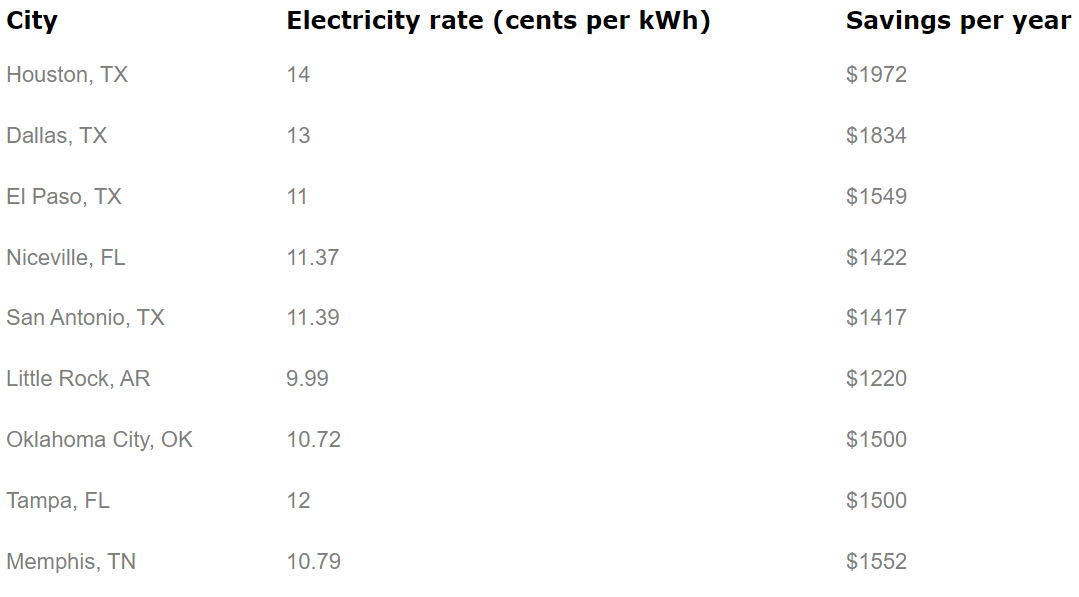SAVINGS
SOLAR SAVINGS
HOW GOING SOLAR WILL SAVE YOU ON ENERGY BILLS
Solar panels are one of the greatest and most rapidly expanding kinds of renewable energy on the market, and it’s simple to understand why. They assist to save energy that would otherwise be drawn from the grid, reduce your energy costs, and provide a good financial return. While the initial expenditures may be substantial, the return time is rather short.
Over the lifespan of a solar panel installation, most solar buyers may save between $10,000 and $30,000. Solar panels aren’t only beneficial for the environment; they may also save you money. Savings can vary depending on your region, current energy use trends, and the solar panel installation. Most crucially, solar savings are affected by the cost of power.
Over the lifespan of a solar panel installation, most solar buyers may save between $10,000 and $30,000. Solar panels aren’t only beneficial for the environment; they may also save you money. Savings can vary depending on your region, current energy use trends, and the solar panel installation. Most crucially, solar savings are affected by the cost of power.
SOLAR SAVINGS
Here’s what we’ll cover in this page:
- What are the benefits of purchasing solar panels?
- Is going solar good for the environment?
- How much do solar panels save the common household?
- How to determine how many solar panels cost and if they are worth it in your area?
- How to determine the number of panels required?
- How does your solar system pay for itself in the long run?
- Does embracing solar increase the value of my home?
- What is the purpose of a solar battery? Why do I require it?
What are the benefits of purchasing Solar Panels?
When you purchase your own solar panel system, you are referred to as having system ownership. This can be accomplished through an outright cash purchase or through financing with a solar loan that will ultimately be paid off. UM Power recommends these two methods of ownership over any other method of acquiring a solar system because when you own the system you become eligible for associated incentives.
Boost Your Lifetime Savings
The desire to lower monthly energy expenditures is the most common motivation for considering solar. You will save money with solar over the life of your system by avoiding utility bills and rate hikes.
Solar Tax Credit
The government incentivizes homeowners to go solar through the Federal Solar Investment Tax Credit (ITC) by providing a 26% credit back of your total system cost. Currently, in place in all 50 states, it is only available to those who purchase or finance their solar system.
Reduce Grid Dependence
Purchasing solar panels gives the homeowner control over their energy production requirements. Because the separation of power from energy firms might endanger homeowners who have no voice in the process.
Expected Utility Cost Hikes
Utility companies can raise the cost of energy at their liberty. This uncertainty is a major advantage of owning a photovoltaic system. When your fuel is free (sunlight) and you own your power generator (solar system), you have more control.
Is going Solar good for the environment?
When you opt to install solar electricity, you are indirectly helping the environment. Solar energy is a renewable resource that may be used to replace or minimize the consumption of other forms of energy.
According to a case study conducted by the Centre of Renewable Energy Sources and the Department of Environmental Engineering at the Technical University of Crete, solar energy technologies provide clear environmental advantages over other traditional energy sources. Some of these benefits include reduced greenhouse gas emissions, the prevention of toxic gas emissions, the opportunity to recover damaged and abandoned land, a reduction in the number of necessary transmission lines for energy grids, and better water resource quality.
While it might be tough to notice the immediate environmental benefits of adopting solar, when you look at the broad picture, solar energy is a viable approach that can save our planet. Our present energy supplies are limited. Switching to solar energy allows you to harvest and use a natural resource with limitless potential without causing more harm to the environment.
How much do Solar Panels save the common household?
Let’s start with a disclaimer: only a Solar Specialist can correctly estimate how much you can save with solar panels.
However, as a point of reference, we’ll go through an ordinary situation for a homeowner in the United States.
Calculating Solar Power Savings
In terms of solar panel savings, you may estimate how much you will save by knowing how much you presently pay in energy expenditures.
The average power rate in the United States is 13.19 cents per kilowatt-hour (kWh) (as of February 2021).
The average yearly power use for homes is 10,649 kilowatt-hours (kWh), or around 877 kWh per month, according to the EIA.
If you do the numbers, that amounts to almost $1384 in annual electricity expenses.
That is, if you construct a solar system that covers the amount of electricity your home needs and add a solar battery for energy storage, you may be able to avoid paying for energy for the whole life of your solar energy system.
Do you want to discover how much energy your state uses? Here’s a breakdown of how each state ranks:
- Louisiana – 1,273 kWh Per Month
- Tennessee – 1,245 kWh Per Month
- Mississippi – 1,220 kWh Per Month
- Alabama – 1,211 kWh Per Month
- North Dakota – 1,205 kWh Per Month
- Texas – 1,174 kWh Per Month
- Virginia – 1,156 kWh Per Month
- Kentucky – 1,154 kWh Per Month
- Oklahoma- 1,142 kWh Per Month
- Arkansas – 1,133 kWh Per Month
- South Carolina – 1,124 kWh Per Month
- West Virginia – 1,118 kWh Per Month
- North Carolina – 1,098 kWh Per Month
- Georgia – 1,088 kWh Per Month
- Missouri – 1,086 kWh Per Month
- Florida – 1,078 kWh Per Month
- Idaho – 1,055 kWh Per Month
- South Dakota – 1,055 kWh Per Month
- Nebraska – 1,034 kWh Per Month
- Maryland – 1,031 kWh Per Month
- Arizona – 1,049 kWh Per Month
- Washington – 1,041 kWh Per Month
- Indiana – 1,005 kWh Per Month
- Oregon – 976 kWh Per Month
- Delaware – 944 kWh Per Month
- Kansas – 926 kWh Per Month
- Nevada – 924 kWh Per Month
- Iowa – 908 kWh Per Month
- Wyoming – 894 kWh Per Month
- Ohio – 892 kWh Per Month
- Montana – 860 kWh Per Month
- Pennsylvania – 857 kWh Per Month
- Minnesota – 817 kWh Per Month
- Utah – 798 kWh Per Month
- Illinois – 755 kWh Per Month
- Connecticut – 752 kWh Per Month
- Colorado – 723 kWh Per Month
- District of Columbia – 720 kWh Per Month
- Wisconsin – 703 kWh Per Month
- New Jersey – 687 kWh Per Month
- Michigan – 665 kWh Per Month
- New Mexico – 655 kWh
- Massachusetts – 638 kWh Per Month
- Alaska – 632 kWh Per Month
- New Hampshire – 629 kWh Per Month
- New York – 602 kWh Per Month
- Rhode Island – 602 kWh Per Month
- Vermont – 569 kWh Per Month
- California – 557 kWh Per Month
- Maine – 551 kWh Per Month
- Hawaii – 515 kWh Per Month
How to determine how much solar panels cost and if they are worth it in your area
Here’s how much you may save on average by installing solar panels in these big cities:
City
Houston, TX
Dallas, TX
El Paso, TX
Niceville, FL
San Antonio, TX
Little Rock, AR
Oklahoma City, OK
Tampa, FL
Memphis, TN
Electricity rate (cents per kWh)
14
13
11
11.37
11.39
9.99
10.72
12
10.79
Savings per year
$1972
$1834
$1549
$1422
$1417
$1220
$1500
$1500
$1552
City
Houston, TX
Dallas, TX
El Paso, TX
Niceville, FL
San Antonio, TX
Little Rock, AR
Oklahoma City, OK
Tampa, FL
Memphis, TN
Electricity rate (cents per kWh)
14
13
11
11.37
11.39
9.99
10.72
12
10.79
Savings per year
$1972
$1834
$1549
$1422
$1417
$1220
$1500
$1500
$1552

How to determine the number of panels required
The amount of solar panels required for your home is determined by a variety of factors.
How Much Electricity Does Your Home Use?
First and foremost, you must determine how much power your home consumes. This is an important consideration when estimating how many solar panels you’ll require. The more solar panels you have, the more power you will be able to harvest for use in your house. This may be determined by reviewing your previous electric bills and calculating your home’s hourly energy requirements.
Make an appointment with our specialist if you need assistance with these calculations.
Make an appointment with our specialist if you need assistance with these calculations.
How Much Sunlight Does Your Home Get?
Find out how much sunlight your home receives during peak hours with Google’s Project Sunroof program.
Multiply your hourly use by 1,000 to get an idea of how many watts per hour your home will need to produce each hour utilizing solar panels. It is around 1,250 watts per hour for a typical household.
What Are Your Home Energy Objectives?
What your house energy objectives are is another aspect in choosing how many solar panels you need. For example, if you want to use solar energy to totally meet your energy needs, you’ll need extra solar panels as well as battery storage to store the excess electricity for the night. A smaller system can be installed if you simply want to cover a portion of your home’s energy use.
How to Assess the Quality of Your Solar Panels
The type of solar panels you pick is another important component in determining how many solar panels you’ll need. The quality of a solar panel, the materials utilized, and the brand all have a significant impact on the amount of electricity your panels produce. How much electricity are solar panels capable of producing? Let us now go through it.
How does your solar system pay for itself in the long run?
There is a “solar panel payback time” when you switch to solar. This is the amount of time it will take you to pay off your solar power system entirely via the savings on your electricity bill. You may calculate this by subtracting the cost of installation from any tax credits, incentives, or rebates. Subtract your monthly energy bill savings from the total cost of solar panel installation.
Does embracing solar increase the value of my home?
Awesome news! According to the Department of Energy, solar panels are considered an upgrade by prospective house buyers, just like a refurbished kitchen or a finished basement. A home with a solar system is an incentive for purchasers to pay a premium in the magnificent state of California, where more and more homes are powered by the sun. Installing a solar energy system has been shown to boost the value of your property.
What is the purpose of a solar battery? Why do I require it?
Solar batteries have become increasingly popular in recent years. You’ve probably heard of some of them, such as LG Chem, Blue Planet, and Tesla Powerwall. What exactly do they do? Simply simple, a solar battery stores extra energy. This implies that you store it instead of selling power back to the grid.
Why would you want to store energy rather than sell it? For one thing, it’s a step closer to energy independence because some utilities charge “time of use” charges. Because these prices change, you may find yourself paying more for some utilities when demand is higher. A battery can assist you in avoiding this price increase.
The most tempting benefit of a solar battery is that it can provide backup power when the electricity goes out. PSPS power off? Is there a county-wide blackout? Not your problem! While everyone else’s power goes off, your house or company will keep the lights on.
Keep in mind that solar batteries have limitations. Your UM Power expert will fully explain how much battery backup you will require.
BEGIN SAVING WITH A FREE SOLAR QUOTE
Assuming you’re prepared to do the change to sun powered, get a free statement and a free counsel to find every one of your choices. We introduce sunlight based charger frameworks across the United States, so get in touch with us today to check whether we administration your region and get free sun powered statements for your specific requirements.
- 25 Year Labor Warranty
- 25 Year Production Guarantee
- 25 Year Solar Panel Manufacturer Warranty
- 25 Year Enphase Microinverter Warranty
- Thousands of happy homeowners
- Free Home Energy Audit
- Roof replacement experts


